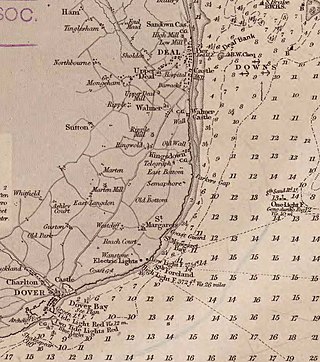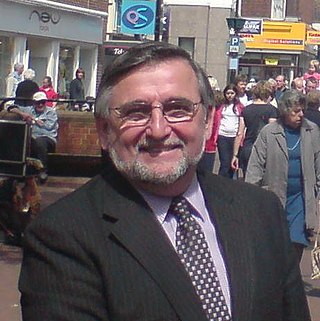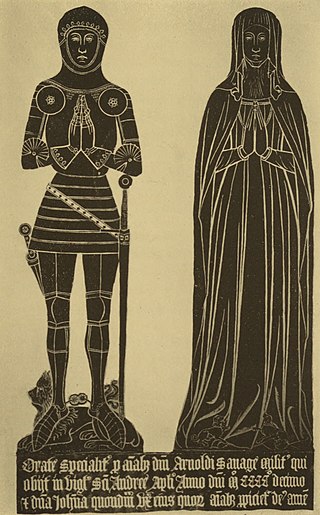This article relies largely or entirely on a single source .(December 2020) |
John Robins (born c. 1511) was an English politician.
This article relies largely or entirely on a single source .(December 2020) |
John Robins (born c. 1511) was an English politician.
Little is known of Robins' personal life, and he is not thought to be originally from Dover. His date of death is unrecorded. [1]
He was a mariner. In 1559 and 1563, Robins was Member of Parliament for Dover, Kent. In 1562–63 and 1575–76 he was Mayor of Dover. [1]

Kent is a county in the South East England region, the closest county to continental Europe. It borders Essex across the entire estuary of the River Thames to the north; the French department of Pas-de-Calais across the Strait of Dover to the south-east; East Sussex to the south-west; Surrey to the west and Greater London to the north-west. The county town is Maidstone.

The Downs is a roadstead in the southern North Sea near the English Channel off the east Kent coast, between the North and the South Foreland in southern England. In August 1511, Andrew Barton, a privateer, was killed in battle on board his ship. In 1639 the Battle of the Downs took place here, when the Dutch navy destroyed a Spanish fleet which had sought refuge in neutral English waters. From the Elizabethan era onwards, the presence of the Downs helped to make Deal one of the premier ports in England, and in the 19th century, it was equipped with its own telegraph and timeball tower to enable ships to set their marine chronometers.

Gwynfor Matthews Prosser is a British politician and engineer who served as Member of Parliament (MP) for Dover from 1997 to 2010. A member of the Labour Party, he worked as a marine engineer and served on Dover District Council and Kent County Council prior to his election to Parliament.

Earl of Romney is a title that has been created twice.

John Dixwell, alias James Davids, was an English lawyer, republican politician and regicide. Born in Warwickshire, during the Wars of the Three Kingdoms he held various administrative positions in Kent on behalf of Parliament, and approved the Execution of Charles I in January 1649. Under the Commonwealth, he served as Governor of Dover Castle, and was a member of the English Council of State.

The London, Chatham and Dover Railway was a railway company in south-eastern England created on 1 August 1859, when the East Kent Railway was given parliamentary approval to change its name. Its lines ran through London and northern and eastern Kent to form a significant part of the Greater London commuter network. The company existed until 31 December 1922 when its assets were merged with those of other companies to form the Southern Railway as a result of the grouping determined by the Railways Act 1921. The railway was always in a difficult financial situation and went bankrupt in 1867, but was able to continue to operate. Many of the difficulties were caused by the severe competition and duplication of services with the South Eastern Railway (SER). However, in 1898 the LCDR agreed with the SER to share the operation of the two railways, work them as a single system and pool receipts: but it was not a full amalgamation. The SER and LCDR remained separate companies with separate shareholders until both becoming constituents of the Southern Railway on 1 January 1923.
Thomas Kelsey rose from obscurity as a "London tradesman" to become an important figure in the government of Oliver Cromwell.

Dover is a constituency represented in the House of Commons of the UK Parliament since 2019 by Natalie Elphicke, a Conservative.

Nonington, is a civil parish and village in east Kent, halfway between the historic city of Canterbury and the channel port town of Dover. The civil parish includes the hamlets of Easole Street, to which it is conjoined, Holt Street and Frogham. The 2021 census gives the population of the parish as 920. The area of the parish at 31 December 2020 is 2,510 acres (1,020 ha).
Sir Lionel Duckett was one of the merchant adventurers of the City of London. He was four times Master of the Mercers' Company, and Lord Mayor of London in 1572.
Thomas Greene of Bobbing, Kent, 2nd Proprietary Governor of Maryland was an early settler of the Maryland colony and second Provincial Governor of the colony from 1647 to 1648.

Sir Arnold Savage of Bobbing, Kent was the English Speaker of the House of Commons from 1400 to 1402 and then again from 1403 to 1404 and a Knight of the Shire of Kent who was referred to as "the great comprehensive symbol of the English people".
Sir Thomas Browne was a Member of Parliament and Chancellor of the Exchequer. Browne's tenure as Chancellor occurred during the Great Bullion Famine and the Great Slump in England. He was executed for treason on 20 July 1460.

Sir Henry Guildford, KG (1489–1532) was an English courtier of the reign of King Henry VIII, master of the horse and comptroller of the royal household.
Sir Robert Furnese, 2nd Baronet, of Waldershare, Kent, and Dover Street, Westminster, was an English Whig politician who sat in the British House of Commons from 1708 to 1733.

Sir John Hippisley was an English privateer and politician who sat in the House of Commons at various times between 1621 and 1653. He supported the Parliamentary cause in the English Civil War.
John Robins may refer to:

Sir John Scott was the eldest son of Sir William Scott of Scot's Hall. He served in King Henry VIII's campaigns in France and was active in local government in Kent and a Member of Parliament for New Romney. He was the grandfather of both Reginald Scott, author of The Discoverie of Witchcraft, a source for Shakespeare's Macbeth, and Thomas Keyes, who married Lady Mary Grey.
John Trevanion was a British politician who sat in the House of Commons for 32 years between 1774 and 1806.